Language development in infants is an incredible journey marked by various milestones that signify progress in both receptive and expressive language skills. These milestones, often celebrated by parents, indicate the growing ability of infants to communicate and understand the world around them. While each child progresses at their own pace, there are general guidelines that parents can follow to track their child’s language development.
One of the most anticipated milestones in language development is the emergence of the first word. Most children speak their first word between the ages of 10 to 14 months, with common utterances like “ma-ma” or “da-da” often marking this exciting moment. By their first birthday, many infants are saying one to three words, albeit in simple and incomplete forms. While this milestone is eagerly awaited by parents, it’s essential to remember that every child develops at their own pace, and some may take longer to utter their first words.
In addition to spoken words, infants also use gestures to communicate their needs and desires. These gestures, such as pointing or waving, often accompany their attempts at speech and help them convey meaning to their caregivers. As infants grow older, their reliance on gestures decreases, making way for a more extensive vocabulary and clearer communication.
As language skills continue to develop, infants begin to name familiar objects and body parts, typically between the ages of 12 to 18 months. They may point to objects when prompted and show interest in naming items they encounter in their environment. This period is characterized by rapid language acquisition, with infants eagerly absorbing new words and concepts.
Listening skills also play a crucial role in language development during infancy. Infants enjoy being read to and listening to songs and rhymes, which help expand their vocabulary and understanding of language. By 18 months of age, most infants have a vocabulary of at least ten words, with word acquisition increasing dramatically thereafter. Parents can foster language development by engaging in frequent conversations with their infants and exposing them to a variety of words and sounds.
By their second birthday, infants are typically able to use and understand many words, putting together two-word “sentences” to express themselves. They may refer to themselves by name and follow simple directions with ease. While their speech may still be imperfect, with some consonants harder to pronounce than others, infants demonstrate remarkable progress in their ability to communicate effectively.
Despite these exciting milestones, there are certain red flags that parents should watch out for in their child’s language development. Difficulty understanding simple words or following directions, limited vocabulary, and excessive babbling beyond the age of two may indicate potential delays in language development. Parents should consult with their pediatrician if they have concerns about their child’s progress or if they notice any significant deviations from typical language milestones.
Overall, the first two years of life are a period of rapid growth and development, marked by significant achievements in language acquisition. Parents play a crucial role in supporting their child’s language development through frequent interaction, reading, and exposure to language-rich environments. By celebrating each milestone and addressing any concerns along the way, parents can help ensure that their child reaches their full potential in language development.
